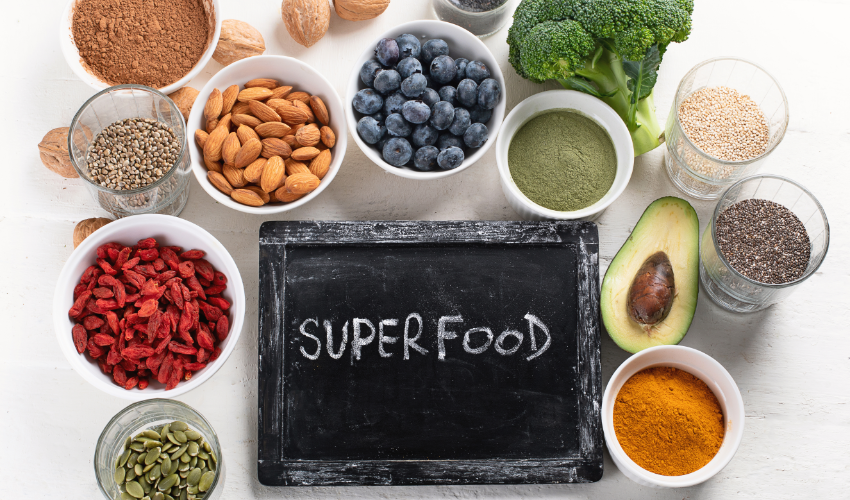Superfoods are foods that are nutritionally dense and have many health benefits. They are considered to be some of the most nutritious foods in the world and have become increasingly popular due to their health benefits. Superfoods can help you maintain optimal health, improve your overall well-being, and prevent various health conditions.
What is considered a Superfood?
A superfood is defined as a food that is packed with high levels of nutrients, vitamins, and minerals that are essential for good health. These foods are known for their high antioxidant content, anti-inflammatory properties, and ability to boost the immune system. Some of the most common superfoods include acai berries, blueberries, kale, quinoa, and salmon.
Superfoods are also known for being low in calories, but high in fiber, making them a great option for people who are looking to lose weight. They are also a great source of energy and can help improve digestion, as well as improve heart health.
Top 10 SuperFoods
Superfoods are nutrient-dense foods that are packed with essential vitamins, minerals, and antioxidants. These foods have been shown to have a positive impact on overall health and well-being and can help improve heart health, lower the risk of cancer, improve brain function, aid in weight loss, increase energy levels, and improve digestion.
List of Top 10 Superfoods
- Blueberries
- Acai Berries
- Kale
- Salmon
- Quinoa
- Chia Seeds
- Spinach
- Avocados
- Goji Berries
- Almonds
The Most Powerful Superfood
The most powerful superfood is subjective and can vary based on individual needs and preferences. However, some of the most commonly recognized superfoods include blueberries, acai berries, kale, salmon, and quinoa. These foods are known for their high nutrient density, antioxidant content, and anti-inflammatory properties.
Blueberries, for example, are a rich source of antioxidants and are known for their ability to improve brain function, prevent heart disease, and lower the risk of cancer. Acai berries are also high in antioxidants and have been shown to improve heart health, aid in weight loss, and boost energy levels.

Kale is another powerful superfood that is known for its high levels of vitamins and minerals, as well as its anti-inflammatory properties. It is also a great source of fiber and can help lower cholesterol levels and improve heart health.
Salmon is a great source of omega-3 fatty acids and is known for its ability to improve heart health, reduce inflammation, and improve brain function. Quinoa, on the other hand, is a complete protein that is high in fiber and minerals, making it a great option for people who are looking to maintain a healthy diet.
Benefits of Superfoods
Superfoods have a wide range of health benefits and can help improve overall health and wellbeing. Some of the benefits of consuming superfoods include:
- Improved heart health
- Lower risk of cancer
- Improved brain function
- Aid in weight loss
- Increased energy levels
- Improved digestion
- Reduced inflammation
- Stronger immune system
- Better skin health
- Improved mood
It is important to remember that while superfoods have many health benefits, they are not a cure-all and a balanced diet that includes a variety of healthy foods is the best approach to maintaining optimal health. Nevertheless, incorporating superfoods into your diet can have a positive impact on your overall health and well-being.
How Superfoods Work
Superfoods work by providing the body with high levels of essential nutrients, vitamins, and minerals that are essential for good health. They also contain high levels of antioxidants and anti-inflammatory properties, which help protect the body against cellular damage and reduce inflammation.

When consumed regularly, superfoods can help improve heart health, lower the risk of cancer, improve brain function, aid in weight loss, increase energy levels, and improve digestion. They can also boost the immune system, improve skin health, and improve mood.
Can I Take Too Much Superfood?
While superfoods are generally considered to be safe, it is possible to consume too much of them. Consuming too many superfoods can lead to an imbalance in your diet and lead to nutrient deficiencies. It is important to consume superfoods in moderation and to include a variety of healthy foods in your diet.
Additionally, some superfoods may have interactions with certain medications, so it is important to speak with your healthcare provider before incorporating them into your diet. It is also important to note that superfoods are not a substitute for a balanced diet and should not be relied upon as a cure-all for health problems.
Incorporating superfoods into your diet can have a positive impact on your overall health, but it is important to consume them in moderation and include a variety of healthy foods in your diet. Consult with your healthcare provider before making any changes to your diet.
Conclusion
Superfoods are nutrient-dense foods that are packed with essential vitamins, minerals, and antioxidants. They have been shown to have a positive impact, including improving heart health, lowering the risk of cancer, improving brain function, aiding in weight loss, increasing energy levels, and improving digestion.
It is important to consume them in moderation and include a variety of healthy foods in your diet. It is also important to speak with your healthcare provider before incorporating superfoods into your diet, especially if you are taking any medications.
We hope that this article has provided you with valuable information about superfoods and the benefits they can provide. We encourage you to incorporate these top 10 superfoods into your diet and to speak with your healthcare provider before making any changes to your diet. By making small changes to your diet, you can help improve your overall health and wellbeing.
